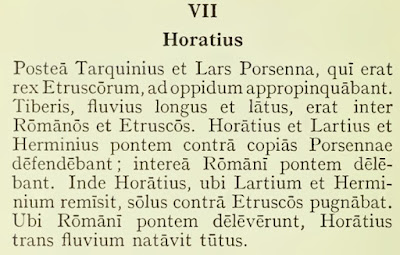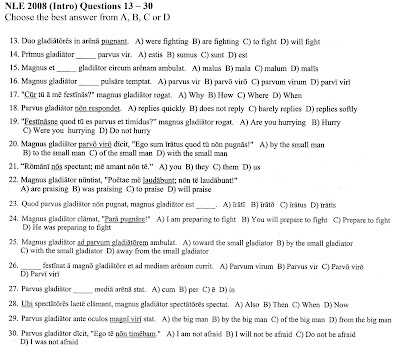līmus, -ī [2/m]: mud
mōs, mōris [3/m]: manner / way of behaving
namque: for; since i.e. because
pāreō, pārēre [2]: obey; the verb is followed by a noun in the dative case
pūrgō, purgāre, pūrgāvī [1]: clean
sapiēns, sapientis: wise
1. Where exactly did the crocodile live? [2 points]
2. What did the crocodile do when the sun was shining? [3 points]
3. How did the bird help the crocodile? [4 points]
4. What two good characteristics did the crocodile have, and which bad one? [4 points]
5. Who also lived in the same place? [1 point]
6. How many sons did he have? [1 point]
7. Why is the man described as wise? [1 point]
8. What did he advise his first son not to do, and why? [3 points]
9. How did the son react to his father’s advice? [2 points]
10. What did the crocodile do when he saw the boy? [2 points]
1. What case is ‘O mī fīlī!’
2. What is the meaning of ‘que’ in benevolusque?
- Olim crocodīlus quīdam in Aegyptō habitābat. │ There once lived a certain crocodile in Egypt i.e. quīdam makes the reference non-specific
- Senex quīdam │ a certain old man
- Avis quaedam sapiēns │ a certain wise bird
Many examples of this occur in the Mediaeval text Gesta Rōmānōrum
- Rēx quīdam rēgnāvit, in cuius imperiō erat quīdam iuvenis. │ There ruled a certain emperor in whose empire was a certain young man.
- Imperātrīx quaedam erat, in cuius imperiō erat quīdam mīles │ There was a certain empress in whose empire was a certain soldier
- Perrexit ad quendam philosophum … │ He proceeded / went (on) to a certain philosopher …
- Ad quandam cīvitātem … vēnit │ He came to a certain city.
- Accidit quōdam diē … │ It happened on a certain day …
[2] crocodīlus … cui nōmen Rōbertus erat. │ Literally: a crocodile to whom was the name Robert = a crocodile … whose name was Robert / … who had the name Robert.








































